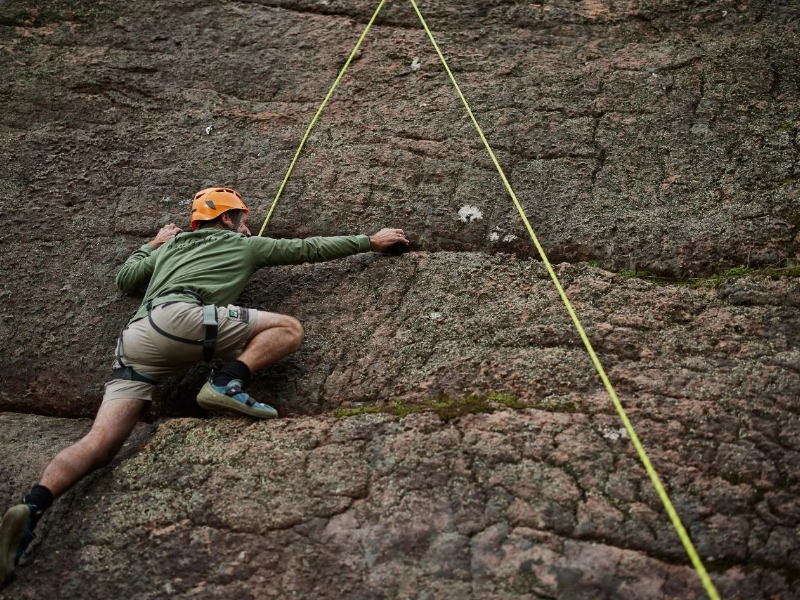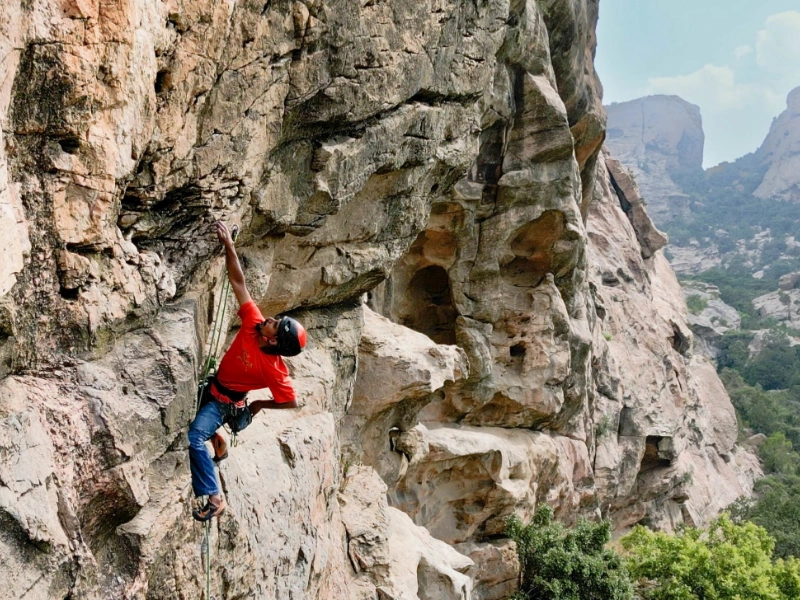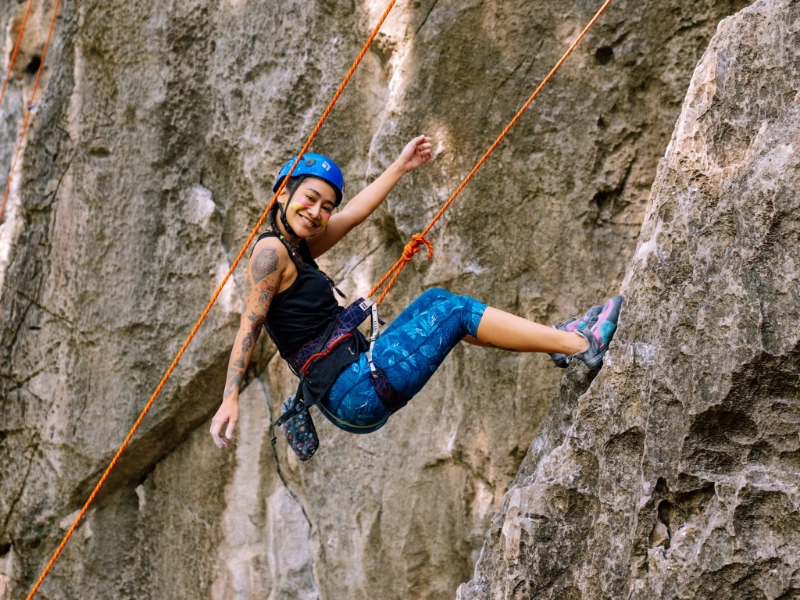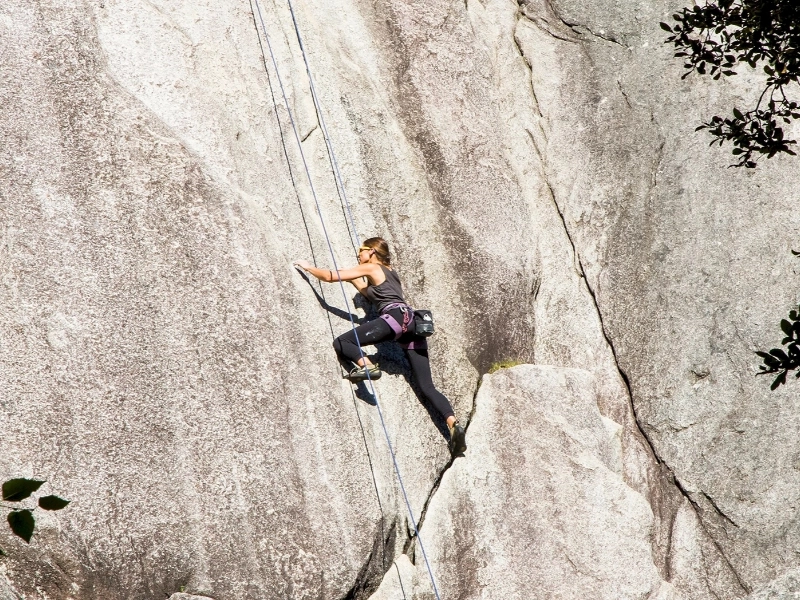Climbing puts strain on the legs, core, and overall body. Climbing increases your strength, endurance, attention, and self-assurance both indoors and outdoors. In contrast to frantic sports like football or running, rock climbing raises your heart rate and works your entire body without causing joint pain. It also builds a variety of muscles, such as the anterior deltoid, rhomboids, and lats, which are the wing-shaped muscles on your back.

 Engaging in rock climbing, a full-body activity, strengthens your muscles, especially your arms, fingers, and core. Additionally, it enhances balance and coordination, both of which are essential for manoeuvring through the several hand and footholds on the wall.
Climbers build their endurance by completing more moves without becoming overly strung out. Working through a session's worth of repeated issues (four or five, for example) frequently accomplishes this. You can also reduce your pump by using proactive recovery techniques such as bending your wrist between grips or opening and closing your fingers.
Try completing long-distance sessions on a route or boulder problem, building up to two minutes of work and 10 minutes of recovery x three, if you want to push your endurance training even farther. This kind of endurance training calls for a strong mind in addition to a strong body. The ability to climb for extended periods without burnout sets the top climbers apart from the group.
Engaging in rock climbing, a full-body activity, strengthens your muscles, especially your arms, fingers, and core. Additionally, it enhances balance and coordination, both of which are essential for manoeuvring through the several hand and footholds on the wall.
Climbers build their endurance by completing more moves without becoming overly strung out. Working through a session's worth of repeated issues (four or five, for example) frequently accomplishes this. You can also reduce your pump by using proactive recovery techniques such as bending your wrist between grips or opening and closing your fingers.
Try completing long-distance sessions on a route or boulder problem, building up to two minutes of work and 10 minutes of recovery x three, if you want to push your endurance training even farther. This kind of endurance training calls for a strong mind in addition to a strong body. The ability to climb for extended periods without burnout sets the top climbers apart from the group.
 Although it doesn't call for toned shoulders and biceps, climbing strengthens the entire body. It strengthens your back, abdomen, arms, legs, and core. "The dynamic movements you engage in climbing—pushing and pulling, balancing and holding yourself in place, moving your feet up to a foothold and then down again—work multiple muscle groups at the same time," according to a spokesperson for the American Council on Exercise.
Climbing requires you to coordinate and strategize every step, like in a chess match. Whether it's a straightforward crack in a smooth rock face or a perilous overhang that demands extraordinary strength to negotiate, you have to measure the distance to your next hand or foothold.
Climbing can help you lose excess weight or maintain a healthy weight because it burns a lot of calories. You should consume a modest, high-carb snack or drink 30 to 60 minutes prior to working out. Avoid spicy and carbonated drinks as they may cause stomach distress.
Although it doesn't call for toned shoulders and biceps, climbing strengthens the entire body. It strengthens your back, abdomen, arms, legs, and core. "The dynamic movements you engage in climbing—pushing and pulling, balancing and holding yourself in place, moving your feet up to a foothold and then down again—work multiple muscle groups at the same time," according to a spokesperson for the American Council on Exercise.
Climbing requires you to coordinate and strategize every step, like in a chess match. Whether it's a straightforward crack in a smooth rock face or a perilous overhang that demands extraordinary strength to negotiate, you have to measure the distance to your next hand or foothold.
Climbing can help you lose excess weight or maintain a healthy weight because it burns a lot of calories. You should consume a modest, high-carb snack or drink 30 to 60 minutes prior to working out. Avoid spicy and carbonated drinks as they may cause stomach distress.
 It takes a lot of mental toughness to climb. Climbing a wall requires not just the strength of your arms and legs but also the placement of those movements, which originate in your brain. It's this mix of strength and dexterity that makes climbing so difficult.
As you climb, you'll develop coping mechanisms for a variety of emotions, including fear and anxiety. Working through obstacles and learning from mistakes can also help you build resilience, which is an important life ability.
Before you climb, consider using visualisation exercises to help you gain confidence. In a calm place, see yourself completing the entire route you are about to take. You'll become more assured and concentrated when you reach your breaking point!
It takes a lot of mental toughness to climb. Climbing a wall requires not just the strength of your arms and legs but also the placement of those movements, which originate in your brain. It's this mix of strength and dexterity that makes climbing so difficult.
As you climb, you'll develop coping mechanisms for a variety of emotions, including fear and anxiety. Working through obstacles and learning from mistakes can also help you build resilience, which is an important life ability.
Before you climb, consider using visualisation exercises to help you gain confidence. In a calm place, see yourself completing the entire route you are about to take. You'll become more assured and concentrated when you reach your breaking point!